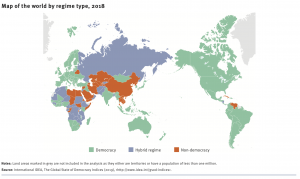Is Democracy in Danger? From a Latin American perspective
On December 16, the Inter-American Dialogue hosted an event to discuss the state of democracy in Latin America. Michael Shifter, President of The Dialogue, introduced the panelists: Thomas Carothers Senior Vice-President for Studies, Carnegie Endowment for International Peace, and Roberta Jacobson, former US ambassador to Mexico.
It is not a secret that Latin America is suffering turbulence of political unrest. Almost all the countries in the region are experiencing this wave of protest, instability, and deterioration of government entities. Even Chile, a role model country for many, suffered weakness after the spontaneous demonstrations followed by the President’s modification of the price of transportation. Maybe the most significant and “stable crisis” in the region is Venezuela—a country with daily protests and a political crisis that is hard to understand given it has two presidents, two legislative branches, and two Supreme Courts.
People argue that democracy is in danger due to a single factor when, in truth, it is more complicated. Different factors play a part: the rise of an authoritarian regime, the control of the media, and technology and power over the citizens. The expert Thomas Carothers used an analogy of a building on fire to explain the crisis. When there is a fire in a building, the last thing you do is to find out what caused the fire; instead, you try to calm things down and evacuate people. Similarly, Carothers argued, Latin America does not need a reflexive moment to think and analyze the past; it needs to start addressing the crisis—or fire. Polarization is another crucial factor in deteriorating democracy. Leaders tend to argue that “their” democracy is better than the one their opponent is offering, so their campaign is focused only on diminishing the adversary instead of proposing better and new solutions to the citizens’ problems.
Democracy is in danger not only in Latin America but also in the rest of the world. Out of the multiple factors, there are some similarities with the rest of the world. Citizens are very unhappy with the institutions or governments, inequality, unfairness, injustice, violent speeches, corruption, and finally, political overreach where politicians take more control of what they already have, for instance, to manipulate an election.
For Ambassador Jacobson, one of the reasons democracy is degrading is the erosion in civil space, the criticism of NGOs, and the press. They are all linked, and authoritarian regimes do their best to control and manipulate their citizens. Civil spaces represent a threat to that control since they are where the society shares its concerns and proposes solutions. That might significant to claim their rights to the government, and that’s not what an authoritarian regimen wants. Ambassador Jacobson considers that corruption is not a transferred value from generations; that’s not the problem. She argues that in the Department of Justice in the US, there are more than 800 cases related to corruption per year. So impunity is the reason, people need to perceive that fairness and justice coming from their high officials.
Kevin Casas-Zamora, Secretary-General of International IDEA, presented a report on how ill democracy is in the world. The report surveyed 158 countries and compared 97 variables from 1975 to the present, among which are: representative government, fundamental rights, checks on government, impartial administration, and participatory engagement. Even though most people perceive that the world is becoming less democratic, data shows the contrary. In 1975, 25% of the population was democratic; today, more than 50% of the countries have a democracy. Furthermore, countries that are adopting a democratic system are lasting longer—over 80% of the states are in a stable and reliable democracy. Still, one of the reasons people consider democracy is in danger or disappearing is because of the quality of these democracies. The report qualifies the countries in three categories: democracies, hybrid regimes, and non-democracies. Strikingly, Venezuela is the only country that changed, in 20 years, from a great democracy to a fully authoritarian regime. The report recommends: restructuring institutions—especially ensuring their independence—, encouraging citizen participation and organization, and reducing political and social polarization as much as possible.

My take:
There is hope in Latin America; I am convinced that the turmoil that we are experiencing will appease. Based on history, we are better than before in terms of freedom and democracy. Nowadays, we have a “problem,” and that is what we are living in an era of rapid communication—if something happens in the other hemisphere of the world, you have instant access to that in seconds. That is, of course, a double-edged sword because we might have the information, but the accuracy of it is dubious. So the reason why I’m saying this is that we tend to compare our status with others; some people in Cuba would dream of having an economy like that of Chile, but Chileans may be comparing themselves to quality of life in Norway. We are making progress in terms of inclusion and freedom. However, we are going at a slow pace. As the experts mentioned, it’s time for more actions; we have plenty of studies that tell us what went wrong and what to avoid in the future.
